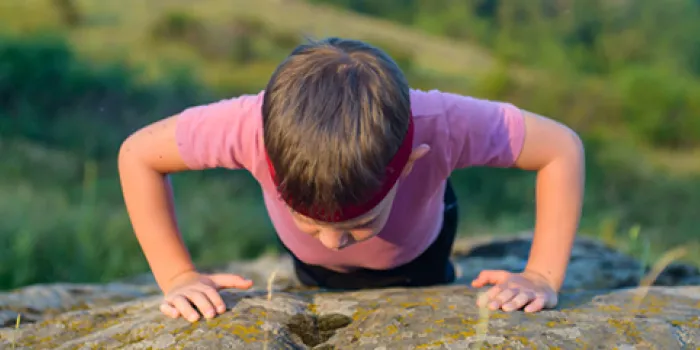Elbows. Knees. Ankles. All those bendy, bony parts of your body let you run, jump and skip. And sometimes it’s so fun, you don’t want to stop—not even for the hot, achy feeling of a bleed.
But hold up. Those same joints that let you scramble and hop are also prime targets for those sneaky bleeds that take you out of the game. If you want to get up and start playing safe sooner, you need to learn how to protect your joints from the inside out.
Listen Up
Your parents will help you talk to the caring doctors, nurses and other staff at your hemophilia treatment center (HTC) about exercise. It’s important to listen up and follow their directions. That way, when you go outside to play, you’re sure you’re protected, with prophylaxis or anything else your HTC recommends. It’s not fun to have to stop playing to treat a bleed, but if your parents tell you to, you should always do it. That way, you can get out and begin playing again sooner!
Look Inside
Your joints have their own built-in armor—your muscles. Strong, flexible muscles keep your joints just where they’re supposed to be so they don’t bend too far, which can cause a bleed. Stronger muscles will also keep your joints better protected as you get older. That way, you won’t bleed as much.
Look Around
Now that you’re moving, check out what’s on your feet and what’s under them. Playing, running and jumping are safer for your joints if you’re on grass or a cushioned surface.
And while you may love to run around barefoot or in socks, you need to wear the right shoes, even in the house. Stick those toes into socks and shoes, and practice tying your sneakers tight.
If your school backpack is too heavy and you can feel it causing a tingly, achy bleed, talk to your parents. You may be able to keep one set of books at school and one at home. That way you don’t have to lug around your backpack and risk a bleed.
Get Out There
Sometimes it may feel like there’s a lot you can’t do, but if you play it safe, there are lots of things you can do. It’s time to get excited about ways you can play without putting pressure on those joints that bleed most often.
If you get elbow bleeds, try exercising something that works your legs more than your arms. If you get a lot of ankle bleeds, try bicycling instead. But make sure to wear a helmet. And swimming like a fish can make you feel great without adding too much stress. Before any exercise, it’s always important to spend a few minutes stretching.
Paying attention to these things can help keep you playing—and keep you off the sidelines. So get out there!
For more articles and fun facts, check out HemAware Jr.

